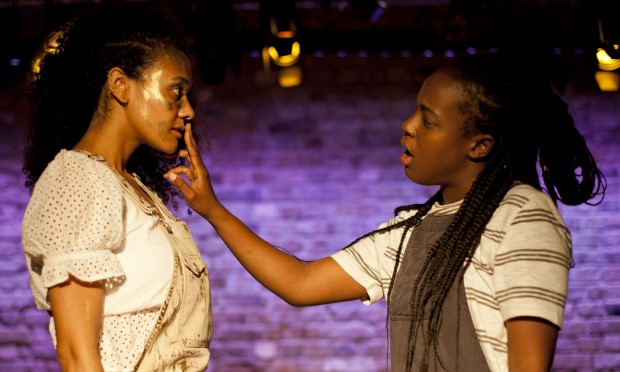Anna Bella Eema, Arcola, review: ‘a ghost story for three bodies with three voices’

As the audience enters the Arcola, leaving behind the commotion of Dalston’s high street, it is flung into the magical world of an unconventional family.
Ten year-old Annabella (played by Gabrielle Brooks) and her 25 year-old mother Irene (Beverley Rudd) live in a derelict American caravan park that is about to be destroyed to build a motorway.
Seeking entertainment, Annabella forges Anna Bella Eema (Natasha Cottriall) from mud, spit, sweat and a little bit of blood.
This creation becomes a way to escape the boredom of everyday life, and also a medium through which Annabella can find freedom she could not otherwise achieve living alone with a mother paralysed by fear of the outside world.
“Anna Bella Eema takes me to many, many places. Places my mother wouldn’t dare go. And when says go, we really GO,” Annabella says.
A few rows of seats in a semicircle around the stage and a slab of concrete in the middle of the room create an intimate environment where the audience soon becomes engrossed in the storytelling.
Annabella and her mother take turns narrating their stories to the audience, interweaving fantasies and ghost stories with reality.
Is Annabella really rowing a boat in the sea with Bertha the Owl or is she dreaming of this while she sleeps for five days?
As Irene says in the opening scene, “sometimes the things that are happening are equal to the things that are not happening.”
Award-winning playwright Lisa D’Amour admits herself that as she tried to pin down her initial thoughts on the plotline, she was unable to write a “box-set, realistic play”.
Rather, she felt the “story wanted prismatic perspective”, which resulted in a spoken and sung ghost story.
The actors interpret their characters remarkably well, using Texan accents to convey fear, excitement or disappointment.
There is a stark contrast between Irene who never leaves home and Annabella who dreams of going on adventures around the world – yet mother and daughter are tied together by a visceral love.
Annabella admits she “cannot live without her” mother and prays every time the social workers come to visit. Irene would do anything to protect her daughter and shield her from outside woes.
The performers are also musically gifted, singing and creating a variety of sound effects as they clink glasses, hiss, clap, purr, stomp their feet, and rub brushes together they maintain the play’s pace.
Anna Bella Eema leaves the audience with a bittersweet feeling. As Annabella says, “the wild creature’s first and most important means of self-defence is its ability to adapt”, though adaptation also comes at a cost.
